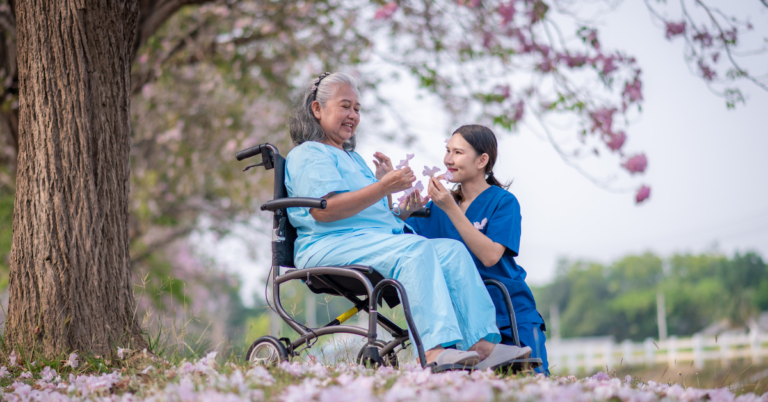
When your loved one lives with dementia, finding moments of connection becomes precious. You watch as familiar faces fade from their memory, yet something remarkable often remains—the deep emotional ties to the songs, symbols and traditions that shaped their younger years. Patriotic themes hold a special place in this landscape of memory care. There’s real comfort in knowing that quality memory care in Muskego, WI and communities nationwide are recognizing this powerful connection.
The Emotional Power of Patriotism in Dementia Care
Why patriotic themes resonate with seniors
The memories that stick around longest aren’t random. They’re the ones wrapped in emotion and patriotic experiences often carry deep emotional weight. War service, community celebrations and historical milestones shared with family—these experiences create what scientists describe as multiple pathways in the brain.
How memory and emotion are linked
Your brain treats emotional memories differently. When something moves you deeply, your amygdala—a small but powerful brain region—essentially stamps that memory as “important”. It’s like having a filing system where emotionally significant experiences get special protection. Music adds another layer of preservation. Patriotic songs light up your brain in ways that simple conversation cannot.
The role of cultural identity in aging
Who we are doesn’t disappear with dementia—it just gets harder to access. Cultural identity, including the patriotic values that shaped earlier generations, remains a cornerstone of self-understanding. For someone whose world feels increasingly confusing, these cultural touchpoints offer stability. There’s another beautiful aspect to this: as people age, they naturally gravitate toward positive emotional experiences. Patriotic activities align perfectly with this tendency, offering uplifting connections that celebrate shared values rather than focusing on loss.
Activities that Connect Seniors with Patriotic Values
Singing national songs and anthems
Start simple and follow their lead:
- Begin with songs like “America the Beautiful” or “Yankee Doodle”—the ones everyone knows
- Keep large-print lyrics handy, but don’t worry if they’re not needed
- Focus on enjoyment, not performance
Watching historical documentaries or parades
Sometimes the best conversations start with something on screen. Historical documentaries or holiday parades can spark stories you’ve never heard before. These visual experiences work well because they don’t require physical participation, making them perfect for seniors with mobility challenges.
Creating patriotic crafts and decorations
Working with your hands often awakens something special. Simple projects—making paper flag garlands or decorating with red, white and blue—give seniors a chance to create while connecting with meaningful symbols. Remember, the magic happens in the doing, not the finished product. Let go of expectations about how things should look. What matters is the smile that crosses their face while they work, the story they tell about a long-ago Fourth of July.
Reminiscence sessions around national holidays
Holiday memories run deep and patriotic occasions often hold some of the richest stories. Guided conversations around Memorial Day, Veterans Day or Independence Day can unlock treasured experiences. These discussions don’t just improve communication—they may actually help maintain cognitive pathways. Try questions that invite storytelling rather than simple yes-or-no answers. “Tell me about your favorite Fourth of July celebration” often works better than “Did you enjoy the holidays?” These open-ended prompts give your loved one space to share whatever memories feel most important to them.
How Art and Music Enhance Memory in Dementia
Art for seniors with dementia: visual storytelling
Sometimes words fail, but creativity doesn’t. Visual art becomes a bridge when verbal communication grows difficult. Through simple painting, drawing or crafting activities, people with dementia can express feelings and thoughts that might otherwise stay hidden. The benefits extend beyond mere entertainment:
- Creates space for expression when speech becomes challenging
- Helps caregivers understand emotional states and preferences
- Stimulates brain regions through tactile and visual engagement
Music therapy and emotional recall
Musical memory operates differently from other types of recall. Research shows that brain regions responsible for musical memory stay largely protected from Alzheimer’s damage. When someone sings familiar songs, it activates multiple brain areas simultaneously, including sections that remain healthy despite disease progression.
Involving Family and Caregivers in Meaningful Ways
Planning intergenerational events
There’s something magical about watching grandchildren and great-grandchildren interact with seniors around shared traditions. Family gatherings around patriotic holidays create natural opportunities for these connections. Consider letting children decorate wheelchairs or walkers with red, white and blue streamers, creating a festive atmosphere that honors your loved one’s contributions. These moments often bring out smiles and engagement that might surprise you.
Encouraging shared storytelling
Even when other abilities fade, the desire to share stories often remains strong. When you visit loved ones in memory care, ask about their military service or the parades they remember from childhood. Sometimes the stories come slowly, but the effort to share them creates a connection regardless of how complete the memory might be.
Creating memory boxes with patriotic items
Memory boxes work because they engage multiple senses at once. Consider gathering:
- Military medals or memorabilia
- American flag fabric or a small flag
- Patriotic music recordings
- Historical photographs
- Fourth of July crafts
The Lasting Value of Patriotic Connections
Your loved one’s connection to patriotic themes offers something precious—a pathway to memories that dementia hasn’t erased. National symbols, familiar songs and cherished traditions reach into parts of the mind that often remain untouched, even as other memories fade away.
Every person’s relationship with patriotic memories is different. Your father might light up when talking about his military service, while your mother responds more to memories of community Fourth of July parades. Pay attention to what brings that spark of recognition to their eyes, then gently build on those moments. The path forward doesn’t have to feel overwhelming. We understand these challenges and can help you find the right approach for your family’s unique situation. Contact us at (414) 425-7155 to learn more about Heritage Muskego, our memory care in Muskego, WI.
FAQs
Q1. How can patriotic themes benefit seniors with dementia? Patriotic themes can trigger emotional memories, reduce agitation and improve cognitive function in seniors with dementia. These familiar elements often resonate deeply, helping to spark moments of clarity and create meaningful connections.
Q2. What types of patriotic activities are suitable for seniors with memory challenges? Suitable activities include singing national anthems, watching historical documentaries or parades, creating patriotic crafts and participating in reminiscence sessions around national holidays. These engage multiple senses and can help stimulate long-term memories.






